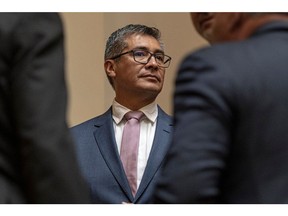
Article content
(Bloomberg) — Bolivia’s new government expects to secure up to $5 billion in multilateral loans next year and return to international credit markets in late 2026 or early 2027, Finance Minister José Gabriel Espinoza said in an interview.
THIS CONTENT IS RESERVED FOR SUBSCRIBERS ONLY
Subscribe now to read the latest news in your city and across Canada.
- Exclusive articles from Barbara Shecter, Joe O'Connor, Gabriel Friedman, and others.
- Daily content from Financial Times, the world's leading global business publication.
- Unlimited online access to read articles from Financial Post, National Post and 15 news sites across Canada with one account.
- National Post ePaper, an electronic replica of the print edition to view on any device, share and comment on.
- Daily puzzles, including the New York Times Crossword.
SUBSCRIBE TO UNLOCK MORE ARTICLES
Subscribe now to read the latest news in your city and across Canada.
- Exclusive articles from Barbara Shecter, Joe O'Connor, Gabriel Friedman and others.
- Daily content from Financial Times, the world's leading global business publication.
- Unlimited online access to read articles from Financial Post, National Post and 15 news sites across Canada with one account.
- National Post ePaper, an electronic replica of the print edition to view on any device, share and comment on.
- Daily puzzles, including the New York Times Crossword.
REGISTER / SIGN IN TO UNLOCK MORE ARTICLES
Create an account or sign in to continue with your reading experience.
- Access articles from across Canada with one account.
- Share your thoughts and join the conversation in the comments.
- Enjoy additional articles per month.
- Get email updates from your favourite authors.
THIS ARTICLE IS FREE TO READ REGISTER TO UNLOCK.
Create an account or sign in to continue with your reading experience.
- Access articles from across Canada with one account
- Share your thoughts and join the conversation in the comments
- Enjoy additional articles per month
- Get email updates from your favourite authors
Sign In or Create an Account
or
Article content
Around half of the loans under discussion with the International Monetary Fund, World Bank, Inter-American Development Bank and Corporacion Andina de Fomento (CAF) are aimed at boosting private-sector transport, energy and infrastructure projects, Espinoza said.
Article content
Article content
Article content
“These $4 to $5 billion won’t be strictly public debt. A good part will be used to leverage private-sector development,” Espinoza said this week, mentioning credit lines, guarantee funds to access tenders and working-capital facilities.
Article content
By signing up you consent to receive the above newsletter from Postmedia Network Inc.
Article content
Centrist President Rodrigo Paz, who took office this month following two decades of socialist rule, is moving quickly to tackle the South American nation’s economic crisis and restore credibility with investors. Long lines for gasoline and diesel have now faded after fuel traders extended credit lines, betting on a brighter economic outlook and renewed US and multilateral support, Espinoza said.
Article content
Timely loan payments, along with a drop in country risk, will position Bolivia to issue new bonds by early 2027, the finance minister said from his office in La Paz.
Article content
“Default is not an option,” Espinoza said when asked about public-debt management, including a $333 million payment due in March on a eurobond maturing in 2028. He said negotiations will take place, but declined to provide details, adding that “all creditors will receive their payment under the conditions in which they feel most comfortable.”
Article content
Article content
Although a domestic gold-purchase system implemented by the central bank in 2023 to address dollar shortages will continue, the minister said “the mechanisms are going to change” in order to foster a formal gold-mining industry that complies with environmental and labor rules.
Article content
Bolivia will create a gold bank with public and private capital to allow government oversight over the strategic metal, he said.
Article content
CAF has already announced a $3.1 billion support program for Bolivia for the next five years, including $550 million approved for short-term disbursement.
Article content
Under previous administration foreign credit typically went to the public sector, this time the goal is to give domestic private companies a more prominent role under specific conditions.
Article content
The Paz administration plans to cut costly fuel subsidies, maintaining targeted support to mitigate the social impact. The issue is sensitive in Latin America, as recent protests in Ecuador showed.
Article content
The government will transfer fuel distribution to the private sector to make it more efficient, while keeping state-owned YPFB in charge of supplying remote places where the market has no incentive to operate, Espinoza said.

.jpg) 3 hours ago
1
3 hours ago
1
 English (US)
English (US)